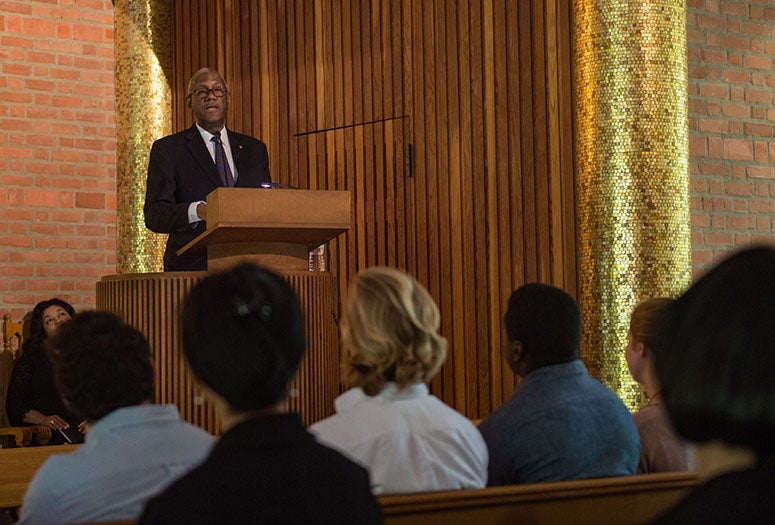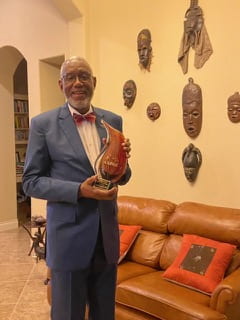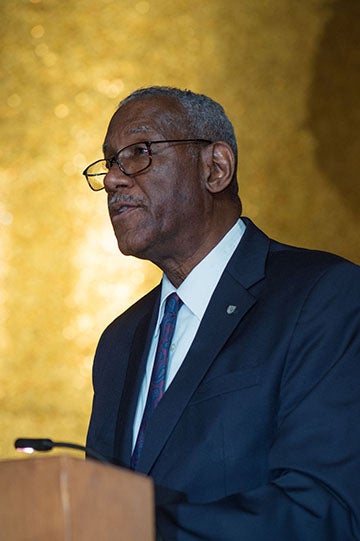It’s not every day someone gets an award named after them, nor is honored as the inaugural recipient of it. But Roland Smith isn’t an everyday person.
The American Association of Blacks in Higher Education (AABHE) recognized this fact March 16 by awarding him the first Dr. Roland B. Smith Jr. Leadership Award. In addition to his work at Rice and within the larger community, Smith is the director of partnerships of the AABHE, an organization he’s served in a variety of leadership roles since 1986, including a term as its president.
“Although I have worked to establish and grow AABHE, the recognition came as a complete surprise and was a humbling experience,” said Smith, associate provost over the Office of Diversity and Inclusion (ODI) and adjunct professor of sociology. “AABHE and Rice have afforded me the gift of relationships and provided me the platform to make a difference, however small, in the lives of others.”
Such an award — and a reaction — is indicative of the lifetime commitment Smith has made to empowering minority students through helping them identify and achieve their goals.
“This is a very significant award, not only for Roland, but for Rice’s stature in diversity, equity and inclusion,” said Fred Higgs, vice provost for academic affairs and director of the Rice Center for Engineering Leadership. “Dr. Smith’s exemplary leadership skills have been instrumental in mentoring and guiding numerous underrepresented professionals to successful career achievements.”
The AABHE had in fact planned on giving Smith his namesake award in 2020, but the pandemic forced a postponement. While Smith was none the wiser about this plan, his staff in the ODI were. And they were sworn to secrecy for the entire year.
"We began to think of how to recognize Dr. Smith’s enormous leadership contributions to AABHE as well as his long tenure with the organization," said AABHE president Dereck J. Rovaris, Sr. "As a result, we came up with a perfect mechanism for our board to simultaneously salute him and to be able to recognize others going forward. The only challenge was keeping it a secret from Roland."
With the long wait over, Smith was given the leadership award during this year’s online AABHE conference. But not only did he receive the honor virtually, Gloria Bean, the ODI’s program manager and department administrator, drove to Smith’s house to hand him the award in person.
In a video the ODI staff made for Smith, Bean laughed: “Surprise, surprise! I kept a secret. Who knew?” Bean was one of many Rice staff, faculty and students who appeared in the video to congratulate Smith and acknowledge the impact he’s made over the years.
“Holding the secret from Roland was both exhausting and exciting,” said Ceola Curley, assistant director of the ODI’s Multicultural Center. “I had one or two near slip-ups over the year, but we're all incredibly excited for Dr. Smith. He is so deserving of this honor.”
Among his roles at Rice, Smith serves as the principal investigator and coordinator for the Mellon Mays Undergraduate Fellowship Program — just one example of his mentorship in action. Each year, a new cohort of Rice students are able to pursue graduate studies thanks to the program, which places underrepresented minority students on the path to a Ph.D. and seeks to diversify higher education.
“His accomplishments and work and life story are immensely inspiring and encouraging,” said Maximilian Murdoch ’20, one of last year’s Mellon Mays fellows, in the congratulatory video. “It gave me the confidence to pursue a career in academia with the knowledge that it’s possible to affect change not just inside the academy but in the lives of people outside of it as well.”
Before coming to Rice in 1996, Smith spent 23 years at the University of Notre Dame as an associate professor of sociology, where he was also the founding director of the Center for Educational Opportunity and the executive assistant to the president. Smith received his bachelor’s degree from Bowie State University, his master’s degree from Indiana University and his doctorate from Harvard University.
In an essay on voting rights for Rice’s Kinder Institute for Urban Research, Smith recalled being “fully engaged in the electoral process” as a high school student, witnessing the lengths his own family members had to endure in order to vote. As an undergraduate, Smith became a campus leader in the civil rights movement at Bowie State and participated in the 1963 March on Washington.
In the 1970s, he served as president of the South Bend, Indiana, chapter of the National Association for the Advancement of Colored People. And in the early 1990s, Smith was asked to serve on the Martin Luther King Jr. Federal Holiday Congressional Commission.
He’s also served as chair of the National Association of Presidential Assistants in Higher Education, a board member of the Texas Association of Black Personnel in Higher Education and past board chair of the LifeGift Organ Donation Center. In 2010, he took on an expanded role within the provost's office and oversaw the creation of the ODI at Rice. Today, Smith continues to teach ethnographic research methods at Rice and mentor students while serving on the Graduate Council and Institutional Review Board.
After a lifetime in higher education, Smith remains passionate about leading others to succeed, a pursuit he said has been influenced — directly and indirectly — by countless people through his work over the years. Paying forward that inspiration has always been a priority.
“I have attempted to demonstrate my honor and gratitude to them by sharing my experiences and insights with generations coming behind me,” Smith said. “My greatest satisfaction is witnessing the growth and achievements of those with whom I have crossed paths.”



